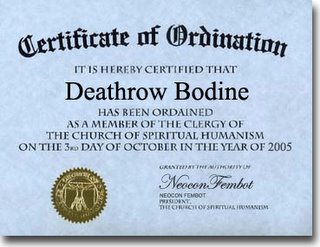
Religion - A cause, principle, or activity pursued with zeal or conscientious devotion.
Secular humanism as an organized philosophical system (a religion) is relatively new, but its foundations can be found in the ideas of classical Greek philosophers such as the Stoics and Epicureans as well as in Chinese Confucianism, Buddhism, and Taoism. (all traditionally considered religions) These philosophical views looked to human beings rather than gods to solve human problems.
Secular humanism has its own organized belief system, publications and “preachers”. Like other religions, it also has a goal: the supplanting of all other religions with its own. It also receives a religious tax exemption.
While secular humanism may not have a mystical aspect, it is a religion nonetheless. It has a doctrine or statement of principles. The imposition of those principles without the equal imposition of contrary statements of principles is a violation of the establishment clause of the Constitution.
The first document describing the beliefs of a secular humanist, the Humanist Manifesto I -1933, refer to themselves in the very first principle as “religious.” It says, “Religious humanists regard the universe as self-existing and not created.” Furthermore, secular humanism described itself as being a religion again in the fifth, seventh, eighth, twelfth, thirteenth, and other sections of the Humanist Manifesto
Humanist Manifesto II – 1973 is slightly less emphatic in describing secular humanism as “religious. It was not until 1980 with the Secular Humanist Declaration did they begin to not call themselves religious. Why did they do so?
It is because the U.S. Supreme Court recognized it to be a religion in 1961 in the case Torkoso v. Watkins. They begin to find it very difficult to IMPOSE their BELIEFS using the FORCE of the government because of the establishment clause of the Constitution.
Interestingly the Humanist Manifesto II – 1973 still said that, “The state should encourage maximum freedom for different moral, political, religious, and social values in society. It should not favor any particular religious bodies through the use of public monies, nor espouse a single ideology and function thereby as an instrument of propaganda or oppression, particularly against dissenters.”
The secular humanist had a problem at this point because they held that the state should not “ESPOUSE A SINGLE IDEOLOGY…” Even those who incorrectly deny that secular humanism is a religion cannot deny that it is an ideology. Therefore, they had to purge any mention of this in their next “Manifesto.” Look up the Humanist Manifesto III.
Clearly, any open-minded and thoughtful observer would identify secular humanism as a religion. It is only those that would seek to deceive and oppress that would state otherwise. The shifting and convolutions of the Humanist Manifestos are clear indications that Secular Humanists are using deception and fraud to supplant all other religions with its own, not by the superiority of their ideas, but rather by the force and might of the government.
No comments:
Post a Comment